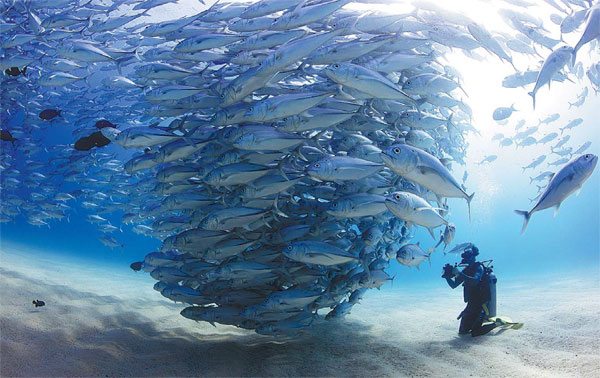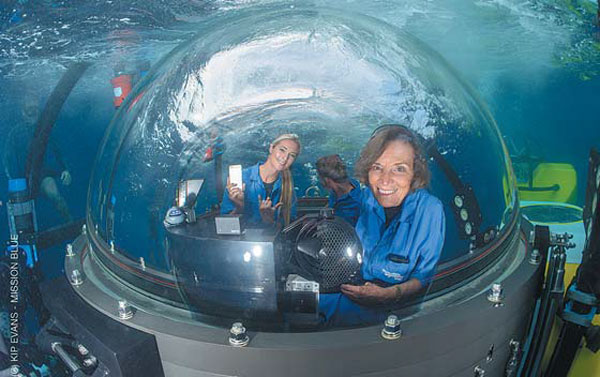'The ocean is in trouble'

Renowned US marine biologist Sylvia Earle says demand for shark fin soup is driving many species to the brink of extinction
The US Library of Congress deems her a Living Legend. Over the past five decades, the mother of three has logged more than 7,000 hours undersea, discovering tens of thousands of species of aquatic life. Even at 80, she continues to spend three months a year on ocean expeditions. Her work has earned her the nicknames Joan of Arc of the Ocean, Hero for the Planet, and best of all, Her Deepness.
She is Sylvia Earle.
| US marine biologist and oceanographer Sylvia Earle dives with a group of jack fish during an expedition. Photos provided to China Daily |
| Sylvia Earle in a submarine during an expedition for Mission Blue, a conservation initiative she launched in 2009. |
When not immersed in the ocean, she's advocating for it. During her eighth visit to China early this month, the renowned US marine biologist and pioneering oceanographer promoted shark conservation by giving a lecture and launching the Chinese version of her 2014 book, Blue Hope: Exploring and Caring for Earth's Magnificent Ocean, in Beijing and Shanghai.
"China is a uniquely important country. The people of China will determine so much of the future of our planet in the coming decades," she says during her speech at Tsinghua University in Beijing. "That's why I am honored to be here and to have the opportunity to speak to you directly, about what I care about: the ocean, its iconic wildlife, and the species that depend on it. That's us."
According to the scientist, sharks are "some of the most magnificent fish in the sea". "Sharks have roamed the ocean for more than 400 million years. ... Without sharks, the ocean will suffer," she says.
In the past 60 years, she says, however, human beings have lost - "actually taken and eaten" - more than 90 percent of the big fish in the ocean, including sharks. People are extracting out of the ocean approximately 100 million sharks each year, and China is the biggest consumer of sharks. The demand for shark fin is driving nearly a third of all the world's shark species to the brink of extinction. Another 25 percent are close to becoming threatened.
"Sharks are in crisis," she says. "The ocean is in trouble."
The good news is that 10 percent of the big fish including sharks still remain in the ocean, she says. There's still time, "but not a lot, to turn things around".
But business as usual means that in a few decades, there will be no commercial fishing for sharks, she says, because they will simply be gone. That's why the decision in 2012 by the Chinese government to prohibit the consumption of shark fin and other wildlife products was a great step forward for global shark conservation, she says. "Chinese consumers can play an incredibly important role in saving the world's sharks from extinction," she says.
That's why she came to China to support a major new conservation initiative, Shark Protection in Action, co-launched by Link Capital Nature & Social Affairs Center, a Beijing-based grassroots conservation NGO, and the Pew Charitable Trusts, a US nonprofit. The goal is to encourage Chinese businesses and individuals to make a pledge not to eat shark fin soup.
At a fully packed lecture hall in Tsinghua, Earle also had a dialogue with popular Chinese actor Liu Ye, who is an Earth Day ambassador and an ardent scuba diver. Liu called Earle his "idol and a source of inspiration" and admitted that he would eat shark fin soup before he met his French wife in 2009. With her, he has started scuba diving. "No eating since then," he says.
Earle shared her experience from her recent expedition in Costa Rica in Beijing. It is one of the world's most famous places to see sharks, and it is also well-known as a marine sanctuary where a great deal of illegal fishing goes on, decimating both the local shark population and sharks that are passing through on their migrations.
In a recent interview, she told UK newspaper The Guardian that she stopped eating fish "probably 40 years ago".
"Basically I have come to understand the value of fish alive in the ocean, just as we've come to understand the value of birds alive to keep the planet functioning in our favor," she says.
However, Earle says in Beijing that she "resisted telling any individual what he or she should or should not consume, because it's a personal choice".
"But I have no problem with making them learn the consequences of what their choices might be. The biggest barrier for protection anywhere in the world is not knowing or understanding the consequences of your actions."
Chinese media recently reported that China plans to expand its fishing operations and focus on small crustaceans known as krill, which Earle says "is ecologically dangerous".
According to the scientist, krill are the cornerstone of the entire living Antarctica ecosystem, because krill are among the small organisms that can access phytoplankton - microscopic organisms that live in watery environments, both salty and fresh. Like land plants, phytoplankton have chlorophyll that capture sunlight and they use photosynthesis to turn it into chemical energy. Krill feed on phytoplankton, converting it into a form suitable for many larger animals, including whales, seals, penguins and seals, for whom krill makes up the largest part of their diet.
"Never in the history of China or any other country until very recent decade have krill being targeted for extracting from this amazing and very critical world," Earle says.
They are an important trophic level connection - near the bottom of the food chain. "If you take them away, you take a critical link out of the system. So what do seals eat, what do the whales eat," she says. "They need krill, we don't."
Still, she is optimistic for the future. "Young people in China are a cause for great hope," she says. "Making a decision to say no to shark fin soup is a decision that can resonate the world."
chenliang@chinadaily.com.cn
(China Daily European Weekly 04/24/2015 page29)
Today's Top News
- Japan tempting fate if it interferes in the situation of Taiwan Strait
- Stable trade ties benefit China, US
- Experts advocate increasing scope of BRI to include soft power sectors
- New engine powers cargo drone expansion
- China to boost green industry cooperation
- Manufacturing PMI rises in November
































